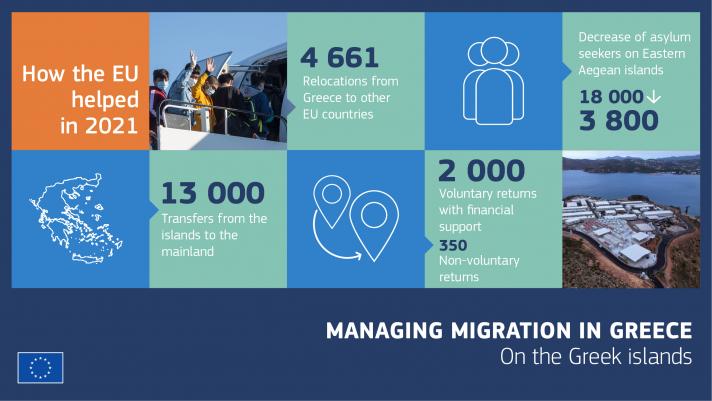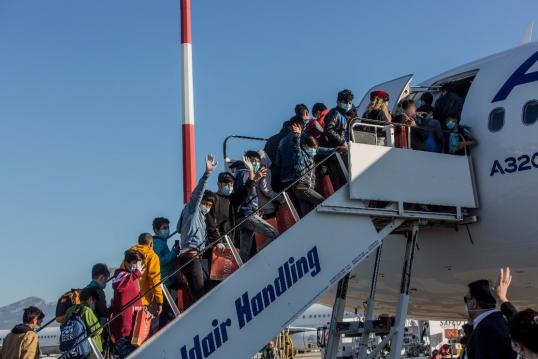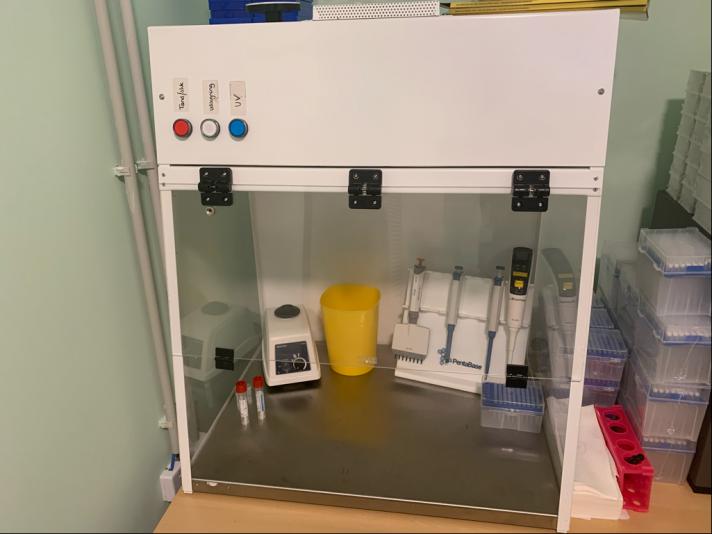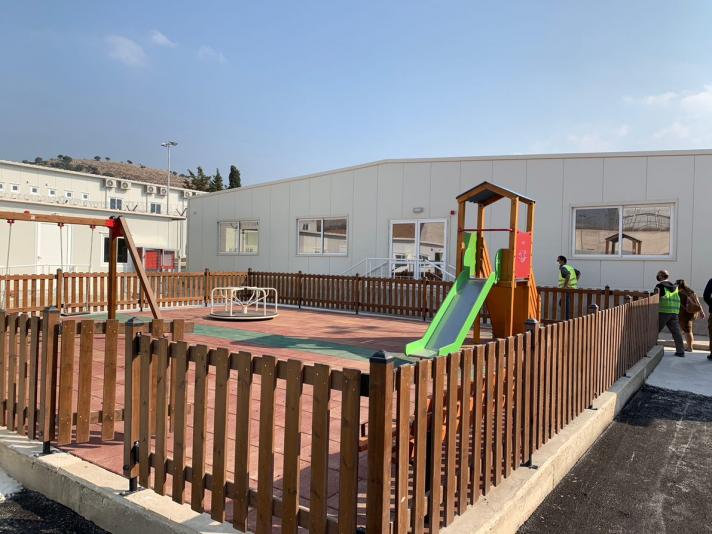
As part of its comprehensive approach on migration, the EU helps its countries to develop and maintain an effective system for sustainable migration management based on solidarity and responsibility sharing.
Greece is one of the countries that received significant support to put in place a system for well-managed migration. In the past years, together with the decrease in irregular migrant arrivals and efforts to improve migration management, the situation in the Greek reception system has significantly improved. In 2020, there were 9 126 irregular arrivals, while in 2021 this number decreased to 3 571 – 60% less. Yet there is still need for progress across several areas. The improvements in 2021 cover a range of aspects of migration management from providing better reception conditions to supporting relocation and integration.
1. Relocations: EU countries showing solidarity
Since April 2020, EU countries have shown solidarity with Greece by relocating asylum seekers and refugees. By the end of 2021, more than 4 600 people were relocated from Greece to other European countries, these include unaccompanied children and teenagers, vulnerable asylum seekers and beneficiaries of international protection. This was possible with the financial support and coordination from the European Commission, as well as the help of the Greek authorities, the EU Agency for Asylum (EUAA), international organisations (IOM, UNHCR and UNICEF) and the cooperation of European countries participating in the relocation process.
Increasing efforts for the return of people without refugee status
In the first 10 months of 2021, the EU-funded Assisted Voluntary Return and Reintegration project supported 2 000 people to return safely to their countries of origin through administrative, logistical and financial support, including reintegration assistance. Of these, 1 800 people from the mainland and 200 from the islands have voluntarily returned from Greece to their country of origin. In addition, an average of 350 non-voluntary returns per month were carried out.
2. Supporting transfers of 13 000 people from the Greek islands to the mainland
In addition to the relocation of asylum seekers and refugees to European countries, internal transfers from reception centres on the islands to the Greek mainland helped to significantly improve conditions for people living on the islands.
Since the beginning of 2021, more than 13 000 people were transferred from the islands to mainland Greece. Combined with low arrivals, this has reduced the number of migrants on the Eastern Aegean islands from 18 000 one year ago down to 3 800 by the end of 2021. Currently, operating with a much lower migrant population, the living conditions for residents in temporary reception centres improved and the processing of asylum applications is conducted at a faster pace.
Currently, the Greek reception system accommodates 38 000 people, spread between reception centres and apartments through the ESTIA accommodation scheme.
3. Opening of new reception centres on Samos, Kos and Leros
Fulfilling one of the main objectives of European Commission’s Task Force for Migration Management, new reception centres were built on the Greek islands of Samos, Leros and Kos.
Besides accommodation and asylum processing areas, all three centres are equipped with:
- hot and cold-water hygiene facilities
- children's playgrounds and sports courts
- medical-care areas
- safe zones for unaccompanied minors
- areas for vulnerable people
- administration areas for the organisations operating inside the centre
- an entry/exit system, where residents and staff can enter by using a personal access card
The reception centre has a modern security system and is fenced to ensure security and safety for the residents and personnel.
4. Reducing the backlog in asylum applications
The improvement of asylum procedures, coupled with a decrease in the number of asylum seekers and refugees on the islands and a general decrease of arrivals, lead to the reduction of the backlog in asylum applications.
Since the beginning of 2021, with the support of the European Agency for Asylum, the Greek Asylum Service has managed to handle around 58 000 end-of-process cases and 21 000 registrations. As of 1 October 2021, the backlog of cases at first and second instance has decreased to 42 000, 52 % lower than the 88 000 cases one year before.
5. Enhancing integration perspectives
The Greek authorities developed a national strategy for integration of refugees into the labour market and the EU is funding activities to support education, housing and employment in Greece.
The EU-funded HELIOS programme supports beneficiaries of international protection to create a new life and home. By the end of 2021, 34 101 beneficiaries enrolled into the HELIOS programme. They receive independent accommodation, integration courses, language classes and employability support. In the future, the project plans to transition and become a part of the European Social Fund Plus (ESF+) enhancing the programme’s services.
6. Protection of unaccompanied children and teenagers
In 2015, when Greece experienced major arrivals of migrants, there were no special rules or accommodation facilities for unaccompanied children and teenagers. Today, the situation has improved, especially since the appointment of the Greek Special Secretary for Unaccompanied Minors in February 2020. These improvements include:
- closing of temporary hotels, replaced by long-term accommodations (shelters and Semi-Independent Living apartments)
- establishment of “safe zones” in reception centres
- increased transfers from the Greek islands to more appropriate conditions on the mainland
- relocations to other European countries
- dedicated projects for unaccompanied children and teenagers, who are homeless or living in precarious living conditions
In the future, special focus should be given to improving national laws and their implementation in practice concerning unaccompanied children and teenagers. The Greek government has developed, adopted and put in place a national strategy and is currently preparing legislation for a special guardianship scheme, which is expected to be tabled in the Greek parliament shortly.
The ongoing relocation efforts have contributed significantly to the reduction of the number of unaccompanied children and teenagers. Less than 2 200 unaccompanied minors were in Greece by the end of 2021, far below the 4 200 in 2020. 1 172 unaccompanied children and teenagers were relocated to other European countries. At the same time, through EU financial support, the number of places in long term accommodation solutions such as shelters, and Semi-Independent Living apartments has risen to 2 200 compared to 1 800 in 2020.
7. COVID-19 pandemic: keeping people safe
In response to the COVID-19 pandemic, the European Commission provided financial support through the Emergency Assistance funds to the project “COVID-19 Emergency Response Action on the Greek islands” implemented by the United Nations High Representative for Refugees (UNCHR). EU funding amounted to approximately EUR 8.2 million lasting from April until the end of December 2020. Among other achievements, the project procured:
- COVID-19 prevention and hygiene support
- medical assistance in setting up testing and isolation areas
- increased stock of essential items
- communication activities on the spread and prevention of COVID-19
To manage COVID-19 related risks among the migrant population in Greece, in November 2020, the European Commission approved EUR 30 million in funding through the Emergency Support Instrument:
- EUR 5 million, for COVID-19 testing in all accommodation structures with the deployment of mobile medical teams by the Hellenic Red Cross
- EUR 25.3 million, to reinforce medical capacity and infrastructure in the Greek reception system and the local communities hosting them
Support measures have proven successful as only 0,83% of all COVID tests performed among the migrant population came out positive.
Vaccination campaign
By the end of 2021, 37% of the population in camps and 39% of the population enrolled into the ESTIA programme were vaccinated. 6.5% have taken the booster and 8.5% have expressed the will to do so. The vaccination rates reflect the fact that a substantial portion of the migrant population in Greece is very young and includes many children. Vaccinations of the first and second dose were carried out in 11 camps and boosters in 9 camps. The vaccination program also applies to new arrivals and continues to be available for those who wish to get vaccinated.
For people without documentation a temporary insurance number was issued and the vaccination campaign is progressing efficiently.
Looking ahead
Recognising that the issue of migration will be critical in the years to come and that good progress has been made in Greece, the emphasis is now on supporting the government to further implement laws and actions targeted to alleviate the social and economic impact in the hosting society, such as the guardianship scheme for unaccompanied children and teenagers. To this end, the EU is leading the way with major initiatives, the Pact on Migration and Asylum being a flagship one, in the context of confidence building, committing EU countries on a new balance between responsibility and solidarity.
By consolidating efforts and progress made in the previous years, the European Commission will continue assisting Greece in addressing migration related challenges in 2022. Most importantly:
- to fully implement the EU-Turkey statement, including resumption of returns
- completing all new reception centres on the islands
- regaining the trust of the local communities through implementation of timely and effective integration policies
Details
- Publication date
- 25 February 2022
- Author
- Directorate-General for Migration and Home Affairs





